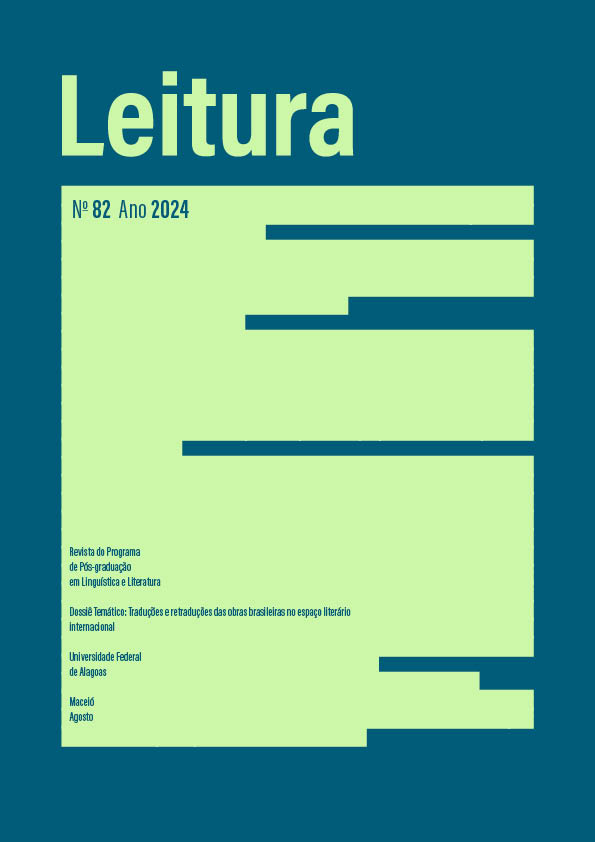O Riso de Fausto
DOI:
https://doi.org/10.28998/2317-9945.202482.214-228Palabras clave:
Riso. Ceticismo. Reconhecimento. Fausto. ModernidadeResumen
This article constitutes an inquiry into one of the most subtle themes in Thomas Mann's novel 'Doctor Faustus' – namely, Adrian Leverkühn’s laughter. Its aim is to establish a connection between a specific element within the novel (Adrian's laughter) and the overarching theme of artistic creation in the modern age. Not only does the author explicitly link the novel to the broader concept of artistic creation, which is its central concern, but the presence of Theodor Adorno, who was both a reader and critic of the work further underscores this connection. Consequently, the question that guides this study is the following: In what way does Adrian's laughter intersect with his own artistic creation? Throughout this article, we make associations with Stanley Cavell's ideas on acknowledgment and the skepticism which refers to its failure. Theorists such as Bergson, Baudelaire, and Morreall provide the foundation for theories of laughter. What’s more, in the essay, the presence of laughter in other Faustian interpretations written in the first half of the twentieth century will also be comparatively addressed. Thus, in this study, Adrian's unique position in the Faustian landscape is shown to be connected to the eruption of laughter, which, far from being a minor detail, proves to be crucial for understanding his artistic production.
Descargas
Citas
ADORNO, Theodor W. Filosofia da Nova Música. Trad. Magda França. São Paulo: Perspectiva, 2011.
BAUDELAIRE, Charles. Sobre a essência do riso. Tradução de Zênia de Faria. Revista UFG, ano 8, n. 2, 2006.
BERGSON, Henri. Laughter: an Essay on the Meaning of the Comic [ebook] Kindle version.
BERNSTEIN, J. M., Aesthetics, Modernism, Literature: Cavell’s transformations of philosophy. In: ELDRIDGE, Richard (Ed.) Stanley Cavell. Cambridge: Cambridge University Press, 2003. p. 107-142.
CAVELL, Stanley. Must we mean what we say? Cambridge: Cambridge University Press, 1976.
_____. Pursuits of happiness: The Hollywood of Remarriage. Cambridge: Harvard University Press, 1981.
_____. The Claim of Reason. New York: Oxford University Press, 1979.
DESCARTES, René. Discurso do Método/ Meditações/ Objeções e Respostas/ As paixões da alma/ Cartas. São Paulo: Abril Cultural, 1973.
Eldridge, Richard (Ed.). Stanley Cavell. Cambridge: Cambridge University Press, 2003.
FRYE, Northrop. Anatomy of Criticism. New Jersey: Princeton University Press, 2000.
LUKÁCKS, Georg. Ensaios sobre literatura. Rio de Janeiro: Editora Civilização Brasileira S. A, 1965.
MANN, Thomas. A gênese do Doutor Fausto: Romance sobre um romance. Trad. Ricardo F. Henrique. São Paulo: Mandarim, 2001.
_____. Doutor Fausto: a vida do compositor Adrian Leverkühn narrada por um amigo. Trad. Herbert Caro. Rio de Janeiro: Nova Fronteira, 2000.
_____. Travessia Marítima com Dom Quixote: ensaios sobre homens e artistas. Trad. Kristina Michahelles e Samuel Titan. Rio de Janeiro: Zahar, 2014.
MILTON, John. Paradise lost. Chicago: Encyclopaedia Britannica, 1952.
MORREALL, John. Taking laughter seriously. New York: State University of New York Press, 1983.
MUECKE, D. C. Ironia e o irônico. Trad. Geraldo Gerson de Souza. São Paulo: Editora Perspectiva, 1995.
PESSOA, Fernando. Primeiro Fausto. São Paulo: Iluminuras, 1996.
_____. Tragédia subjectiva. Rio de Janeiro: Nova Fronteira, 1991.
SCAFF, Susan Von Rohr. Doctor Faustus. In: Robertson, Ritchie (Ed.) The Cambridge companion to Thomas Mann. New York: Cambridge University Press, 2002. p. 167-184.
VALÉRY, Paul. Meu Fausto (Esboços). Trad. Lidia Fachin e Sílvia Maria Azevedo. São Paulo: Ateliê Editorial, 2010.
_____. Monsieur Teste. Trad. Cristina Murachco. São Paulo: Ática, 1997.
_____. Plays. Translated by David Paul and Francis Fergusson. New York: Pantheon Books, 1960.
WEINBERG, Kurt. The Figure of Faust in Valéry and Goethe. New Jersey: Princeton University Press, 1976.










